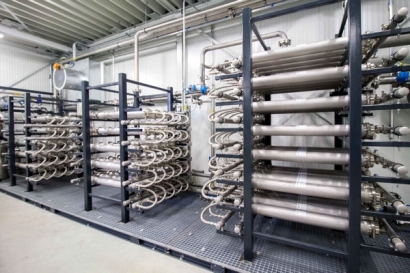
Bright Biomethane will supply the biogas upgrading system to the Dutch waste management company Twence. Biogas upgrading technology ensures that the biogas produced from the pig manure is upgraded into biomethane: the sustainable replacement of fossil natural gas.
At Elhorst-Vloedbelt, a former landfill site, 250,000 tons of pig manure will soon be converted into biogas and raw materials in a manure biogas plant. In the final step, the biogas will be upgraded to biomethane in Bright’s biogas upgrading system with a capacity of 1,000 Nm3 (cubic meters) of biomethane per hour. This is comparable to the annual gas consumption of approximately 3,000 households. The renewable natural gas is distributed to homes and business premises via CoteqNetbeheer's existing natural gas network.
"We supply and build our systems worldwide. Even for locations without gas infrastructure, Bright offers a (virtual pipeline) solution. It is a positive development that our technology is also being used more and more regionally. We are excited that Twence, as a forerunner in promoting the circular economy, is working with Bright to contribute to the regional and national energy transition”, says Maarten Holtkamp, sales director at Bright Biomethane.
"Closer regional cooperation is essential for Twence in making the region more sustainable and promoting regional employment. We are very pleased with the collaboration with Bright. A company that offers a proven, well-developed technology for producing renewable natural gas from residual streams," says project leader Harry Hegeman at Twence.
The Dutch government is promoting the transition from fossil fuels to sustainable energy sources with the goal of an almost completely sustainable energy supply by 2050.
"Developing a sustainable existing built environment, biomethane is the most efficient route. The infrastructure is in place and it is a readily available step for a soon-to-be natural gas-free gas grid," says Maarten. "In addition, manure digestion in combination with biomethane production provides an emission reduction effect. The methane from manure is put to good use by producing the renewable natural gas. This way, the methane is not released into the atmosphere. The manure does not remain in the stables and goes to the manure digester as fresh as possible."
Another advantage of biomethane from manure is the high regional and national availability of manure and the flexibility of this energy source.
The biomethane reaches the end user through the existing gas grid. "The gas network can supply almost 10 times more energy than the electricity grid. We therefore expect the gas network to continue to be used in the future, for example to provide sufficient energy for the cold days we had last week," says Henk Engberts, asset management consultant at CoteqNetbeheer. The network operator is currently investing in the gas network to be able to feed in as much sustainable gas as possible, even in the summer when gas consumption is low. "This project is another nice contribution to this transition!"

